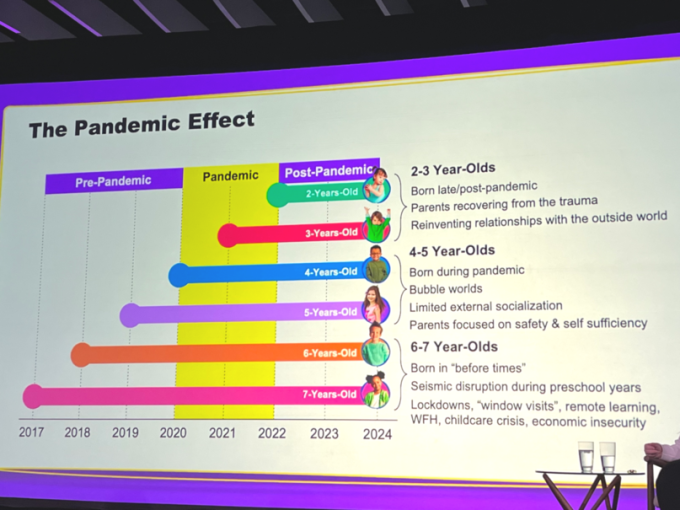The way families raise young children is changing—a trend that was in focus at this week’s Kidscreen Summit event.

Andrea Strauss and Jane Gould on stage.
In a panel called “A New Preschool Paradigm: How Families Are Navigating Life with Young Kids,” industry experts Andrea Strauss (SVP of Nickelodeon Brand & Content Insights) and Jane Gould (co-founder and partner of wonderworks insights + strategy) explored how shifting cultural norms, technology and the pandemic have reshaped parenting, childhood experiences and preschool entertainment. Their discussion revealed how today’s parents have redefined traditional parenting, adapting to a rapidly changing media landscape and navigating the lasting effects of an unprecedented global event.
A major theme of the conversation was the transformation of parenting styles. Parents today prioritize emotional connection, self-expression and adaptability over traditional discipline. Rather than following strict, expert-led guidelines, many are crafting their own parenting approaches, often seeking advice from online communities rather than traditional sources. As Strauss explained, “Kids’ worlds have evolved from a more rigid, authority-based reality to a more flexible, individualized approach. Parenting styles have shifted from control to warmth, and today’s families operate more like teams, where kids’ opinions matter.”
The panel also addressed the lingering effects of the pandemic on young children and their families. Many preschoolers today experienced limited socialization during their formative years, and that has impacted their emotion regulation skills and adaptability. As Strauss emphasized, “The world kids are growing up in has moved from a shared popular culture to one of infinite personalization… This is truly the pandemic generation. Born from 2017 to 2022, their births bookend one of the most disruptive and consequential events in their parents’ lifetimes.”
Gould underlined this, adding that “83% of parents told us that the world was becoming less safe for kids. Eighty-one percent say there’s too much pressure on parents today to be perfect, and 75% say it’s harder to be a parent today than it was for [their] parents.”
Another major focus was the evolving role of digital media. AI-driven algorithms now shape children’s entertainment experiences, creating a highly personalized viewing landscape. As a result, young viewers expect instant, customized content. While this shift has changed the way kids engage with media, it has also influenced parental priorities. Many parents now seek entertainment that fosters emotional intelligence and models positive behaviors, reinforcing the importance of social-emotional learning alongside traditional education.
The conversation also highlighted how parents’ trust in traditional authorities has waned. Unlike previous generations, which largely accepted expert recommendations, today’s parents are more likely to challenge conventional wisdom. Many are embracing alternative educational paths, such as hybrid learning and homeschooling, and turning to social media and peer networks for parenting advice.
Strauss noted that “rather than conformity, the messages kids hear from parents celebrate self-discovery and support individual happiness and new definitions of success. The pendulum has swung from ‘children should be seen and not heard’ to ‘children should be seen, heard and understood.'”
Family bonding emerged as a central theme throughout the discussion. Parents and children today spend more time together than previous generations, prioritizing shared experiences and co-viewing entertainment. According to Gould, “Portraying positive family relationships is key. They are both looking for content that showcases family, parents and kids, because—guess what—they’re in a bubble. It’s all about us. What are we going to do? How will we feel about this? What are we going to watch?” She emphasized that content plays a vital role in strengthening family connections, noting that “91% of parents agree that content offers something the whole family can enjoy together, and 90% agree that watching content helps them bond with their children.”
Ultimately, the panel underscored how parenting and early childhood experiences are undergoing a fundamental transformation. Parents are redefining success, happiness and well-being, adapting to an unpredictable world with more flexible and personalized approaches to raising the next generation.




























